Auditing Report: Singapore Audit Regulations, Ethics, and Quality
VerifiedAdded on 2020/04/13
|10
|1533
|52
Report
AI Summary
This report delves into the intricacies of auditing in Singapore, focusing on the regulatory framework established by the Accounting and Corporate Regulatory Authority (ACRA) and the Institute of Singapore Chartered Accountants (ISCA). It examines the roles and responsibilities of auditors, emphasizing the importance of independence, competency, and the auditing process. The report explores corporate governance, efficiency versus equity, and the development of auditing standards. It also covers auditor qualifications, audit-exempt companies, ethical considerations, non-audit fees, audit firm rotation, director responsibilities, and the expectation gap. Furthermore, it assesses the effectiveness of regulations in assuring audit quality, transparency reporting, and the limitations and costs associated with audit regulation. The report references various scholarly articles to support its findings, providing a comprehensive overview of the audit profession in Singapore.
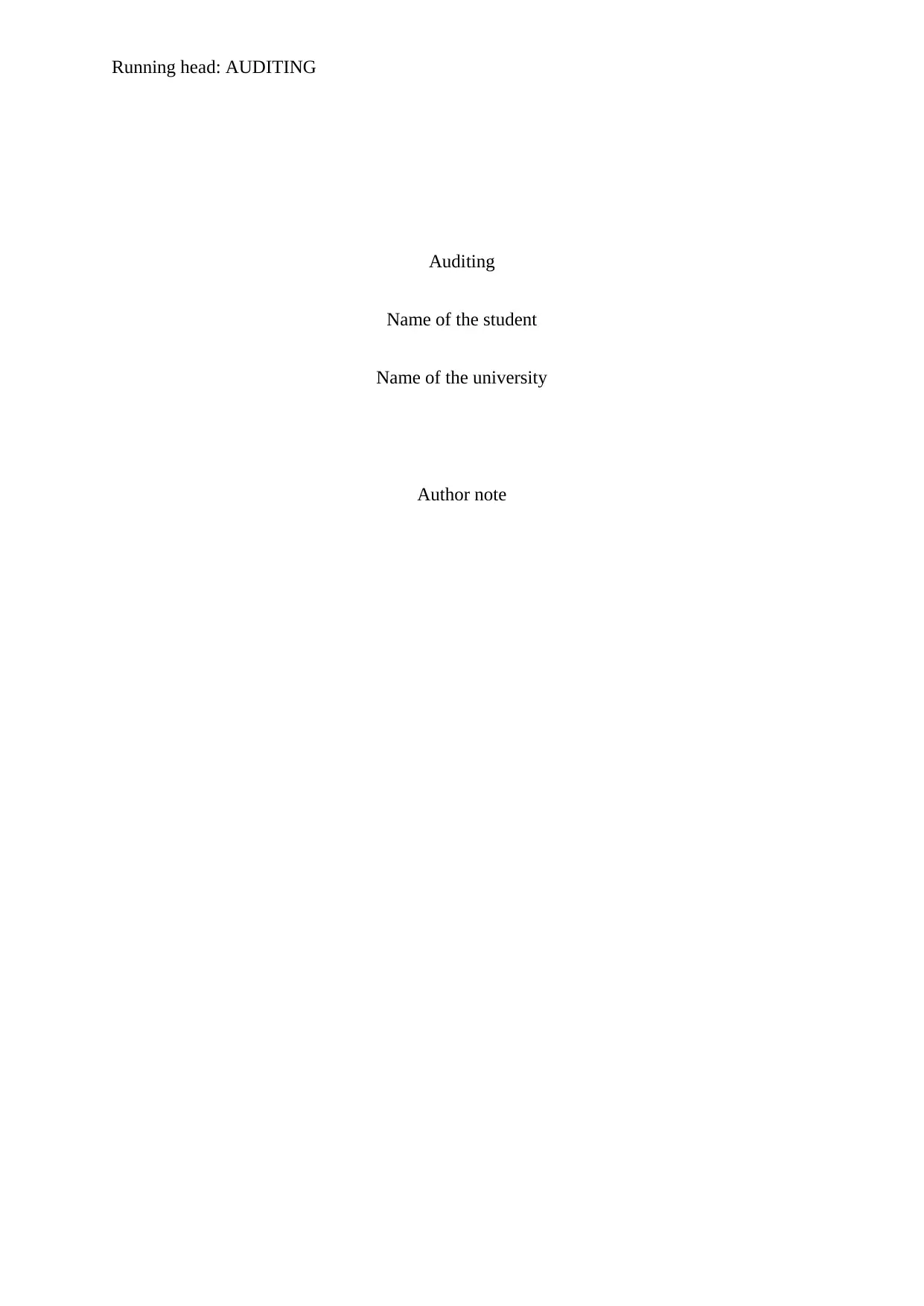
Running head: AUDITING
Auditing
Name of the student
Name of the university
Author note
Auditing
Name of the student
Name of the university
Author note
Paraphrase This Document
Need a fresh take? Get an instant paraphrase of this document with our AI Paraphraser
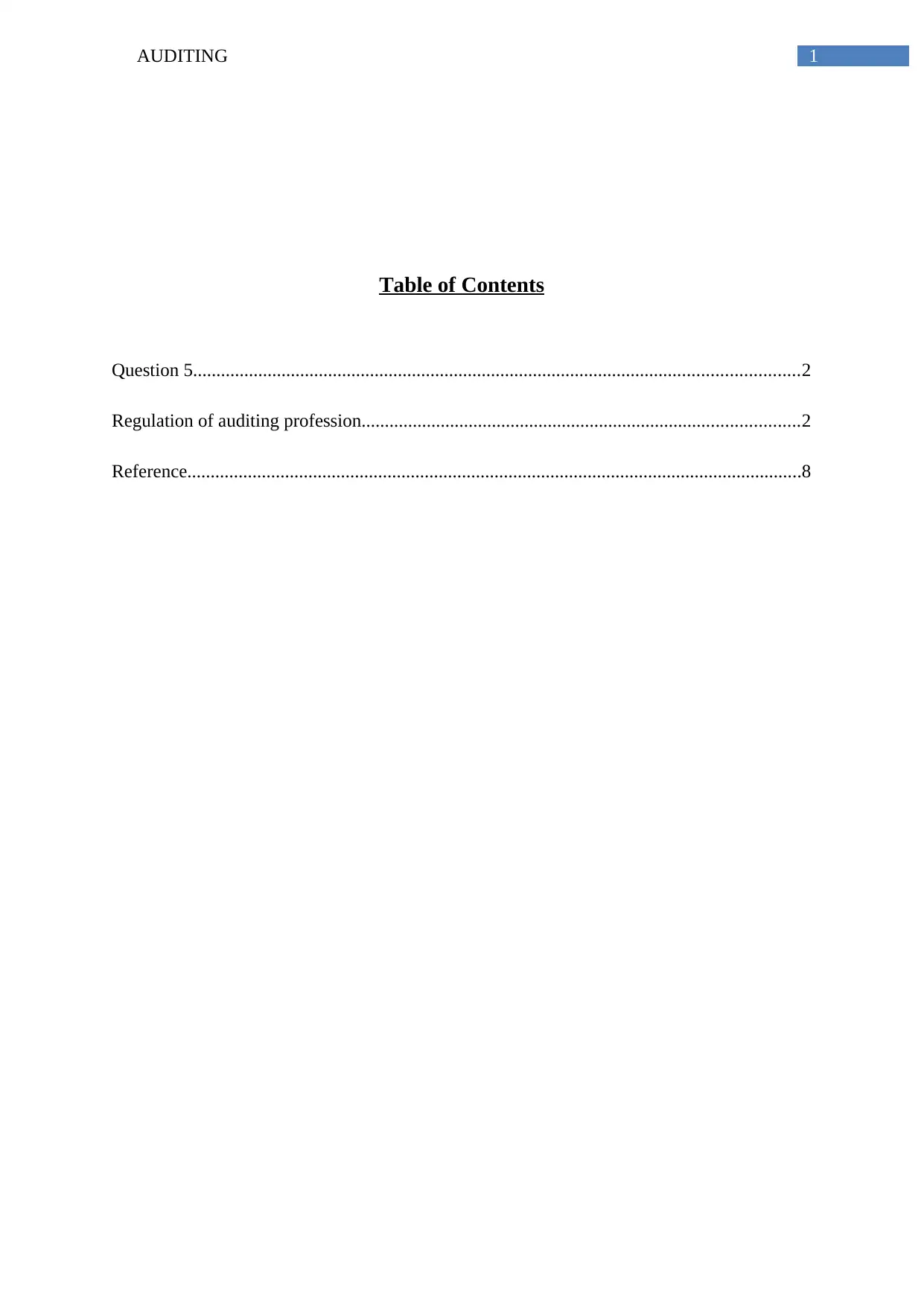
1AUDITING
Table of Contents
Question 5..................................................................................................................................2
Regulation of auditing profession..............................................................................................2
Reference....................................................................................................................................8
Table of Contents
Question 5..................................................................................................................................2
Regulation of auditing profession..............................................................................................2
Reference....................................................................................................................................8
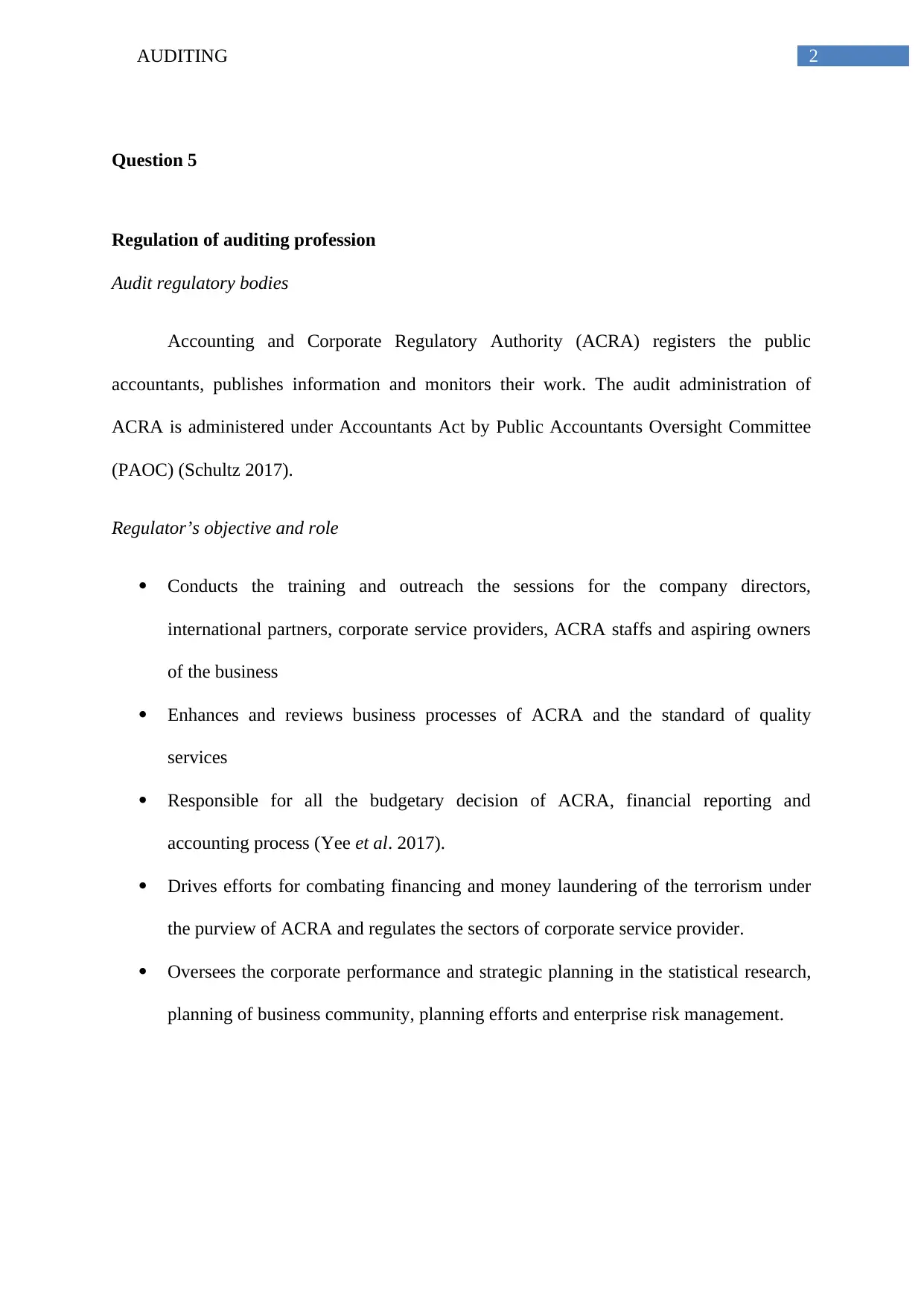
2AUDITING
Question 5
Regulation of auditing profession
Audit regulatory bodies
Accounting and Corporate Regulatory Authority (ACRA) registers the public
accountants, publishes information and monitors their work. The audit administration of
ACRA is administered under Accountants Act by Public Accountants Oversight Committee
(PAOC) (Schultz 2017).
Regulator’s objective and role
Conducts the training and outreach the sessions for the company directors,
international partners, corporate service providers, ACRA staffs and aspiring owners
of the business
Enhances and reviews business processes of ACRA and the standard of quality
services
Responsible for all the budgetary decision of ACRA, financial reporting and
accounting process (Yee et al. 2017).
Drives efforts for combating financing and money laundering of the terrorism under
the purview of ACRA and regulates the sectors of corporate service provider.
Oversees the corporate performance and strategic planning in the statistical research,
planning of business community, planning efforts and enterprise risk management.
Question 5
Regulation of auditing profession
Audit regulatory bodies
Accounting and Corporate Regulatory Authority (ACRA) registers the public
accountants, publishes information and monitors their work. The audit administration of
ACRA is administered under Accountants Act by Public Accountants Oversight Committee
(PAOC) (Schultz 2017).
Regulator’s objective and role
Conducts the training and outreach the sessions for the company directors,
international partners, corporate service providers, ACRA staffs and aspiring owners
of the business
Enhances and reviews business processes of ACRA and the standard of quality
services
Responsible for all the budgetary decision of ACRA, financial reporting and
accounting process (Yee et al. 2017).
Drives efforts for combating financing and money laundering of the terrorism under
the purview of ACRA and regulates the sectors of corporate service provider.
Oversees the corporate performance and strategic planning in the statistical research,
planning of business community, planning efforts and enterprise risk management.
⊘ This is a preview!⊘
Do you want full access?
Subscribe today to unlock all pages.

Trusted by 1+ million students worldwide
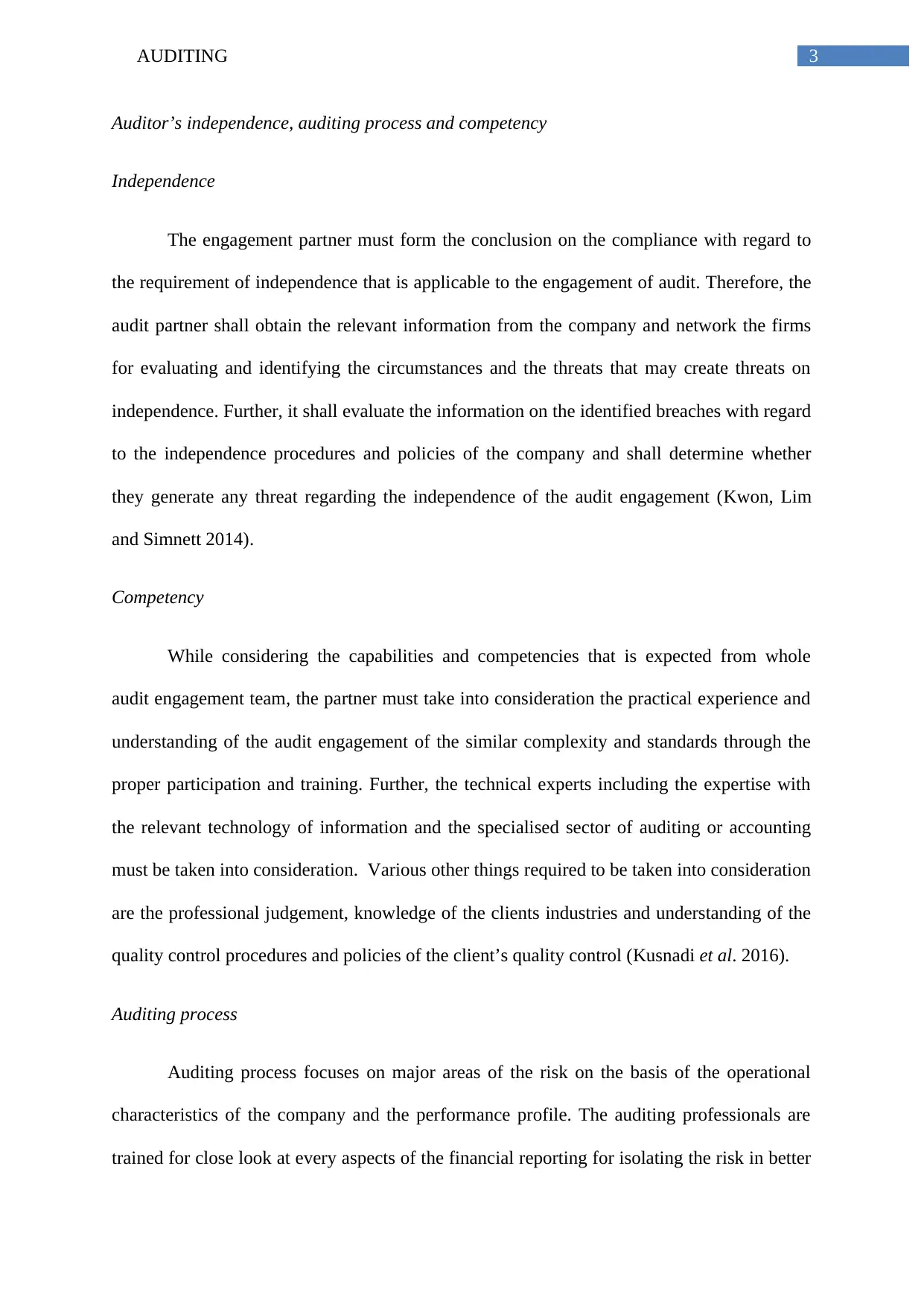
3AUDITING
Auditor’s independence, auditing process and competency
Independence
The engagement partner must form the conclusion on the compliance with regard to
the requirement of independence that is applicable to the engagement of audit. Therefore, the
audit partner shall obtain the relevant information from the company and network the firms
for evaluating and identifying the circumstances and the threats that may create threats on
independence. Further, it shall evaluate the information on the identified breaches with regard
to the independence procedures and policies of the company and shall determine whether
they generate any threat regarding the independence of the audit engagement (Kwon, Lim
and Simnett 2014).
Competency
While considering the capabilities and competencies that is expected from whole
audit engagement team, the partner must take into consideration the practical experience and
understanding of the audit engagement of the similar complexity and standards through the
proper participation and training. Further, the technical experts including the expertise with
the relevant technology of information and the specialised sector of auditing or accounting
must be taken into consideration. Various other things required to be taken into consideration
are the professional judgement, knowledge of the clients industries and understanding of the
quality control procedures and policies of the client’s quality control (Kusnadi et al. 2016).
Auditing process
Auditing process focuses on major areas of the risk on the basis of the operational
characteristics of the company and the performance profile. The auditing professionals are
trained for close look at every aspects of the financial reporting for isolating the risk in better
Auditor’s independence, auditing process and competency
Independence
The engagement partner must form the conclusion on the compliance with regard to
the requirement of independence that is applicable to the engagement of audit. Therefore, the
audit partner shall obtain the relevant information from the company and network the firms
for evaluating and identifying the circumstances and the threats that may create threats on
independence. Further, it shall evaluate the information on the identified breaches with regard
to the independence procedures and policies of the company and shall determine whether
they generate any threat regarding the independence of the audit engagement (Kwon, Lim
and Simnett 2014).
Competency
While considering the capabilities and competencies that is expected from whole
audit engagement team, the partner must take into consideration the practical experience and
understanding of the audit engagement of the similar complexity and standards through the
proper participation and training. Further, the technical experts including the expertise with
the relevant technology of information and the specialised sector of auditing or accounting
must be taken into consideration. Various other things required to be taken into consideration
are the professional judgement, knowledge of the clients industries and understanding of the
quality control procedures and policies of the client’s quality control (Kusnadi et al. 2016).
Auditing process
Auditing process focuses on major areas of the risk on the basis of the operational
characteristics of the company and the performance profile. The auditing professionals are
trained for close look at every aspects of the financial reporting for isolating the risk in better
Paraphrase This Document
Need a fresh take? Get an instant paraphrase of this document with our AI Paraphraser
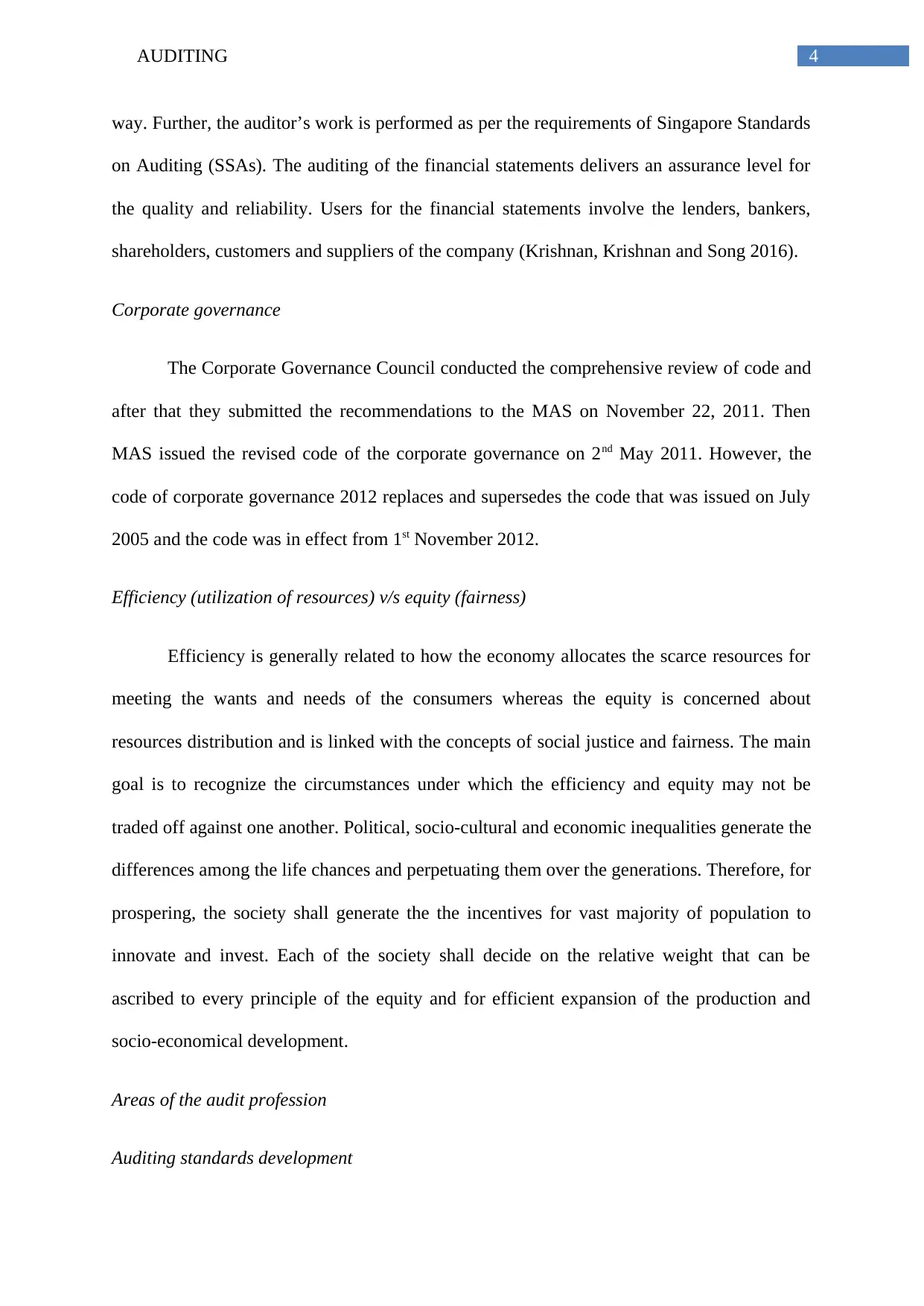
4AUDITING
way. Further, the auditor’s work is performed as per the requirements of Singapore Standards
on Auditing (SSAs). The auditing of the financial statements delivers an assurance level for
the quality and reliability. Users for the financial statements involve the lenders, bankers,
shareholders, customers and suppliers of the company (Krishnan, Krishnan and Song 2016).
Corporate governance
The Corporate Governance Council conducted the comprehensive review of code and
after that they submitted the recommendations to the MAS on November 22, 2011. Then
MAS issued the revised code of the corporate governance on 2nd May 2011. However, the
code of corporate governance 2012 replaces and supersedes the code that was issued on July
2005 and the code was in effect from 1st November 2012.
Efficiency (utilization of resources) v/s equity (fairness)
Efficiency is generally related to how the economy allocates the scarce resources for
meeting the wants and needs of the consumers whereas the equity is concerned about
resources distribution and is linked with the concepts of social justice and fairness. The main
goal is to recognize the circumstances under which the efficiency and equity may not be
traded off against one another. Political, socio-cultural and economic inequalities generate the
differences among the life chances and perpetuating them over the generations. Therefore, for
prospering, the society shall generate the the incentives for vast majority of population to
innovate and invest. Each of the society shall decide on the relative weight that can be
ascribed to every principle of the equity and for efficient expansion of the production and
socio-economical development.
Areas of the audit profession
Auditing standards development
way. Further, the auditor’s work is performed as per the requirements of Singapore Standards
on Auditing (SSAs). The auditing of the financial statements delivers an assurance level for
the quality and reliability. Users for the financial statements involve the lenders, bankers,
shareholders, customers and suppliers of the company (Krishnan, Krishnan and Song 2016).
Corporate governance
The Corporate Governance Council conducted the comprehensive review of code and
after that they submitted the recommendations to the MAS on November 22, 2011. Then
MAS issued the revised code of the corporate governance on 2nd May 2011. However, the
code of corporate governance 2012 replaces and supersedes the code that was issued on July
2005 and the code was in effect from 1st November 2012.
Efficiency (utilization of resources) v/s equity (fairness)
Efficiency is generally related to how the economy allocates the scarce resources for
meeting the wants and needs of the consumers whereas the equity is concerned about
resources distribution and is linked with the concepts of social justice and fairness. The main
goal is to recognize the circumstances under which the efficiency and equity may not be
traded off against one another. Political, socio-cultural and economic inequalities generate the
differences among the life chances and perpetuating them over the generations. Therefore, for
prospering, the society shall generate the the incentives for vast majority of population to
innovate and invest. Each of the society shall decide on the relative weight that can be
ascribed to every principle of the equity and for efficient expansion of the production and
socio-economical development.
Areas of the audit profession
Auditing standards development
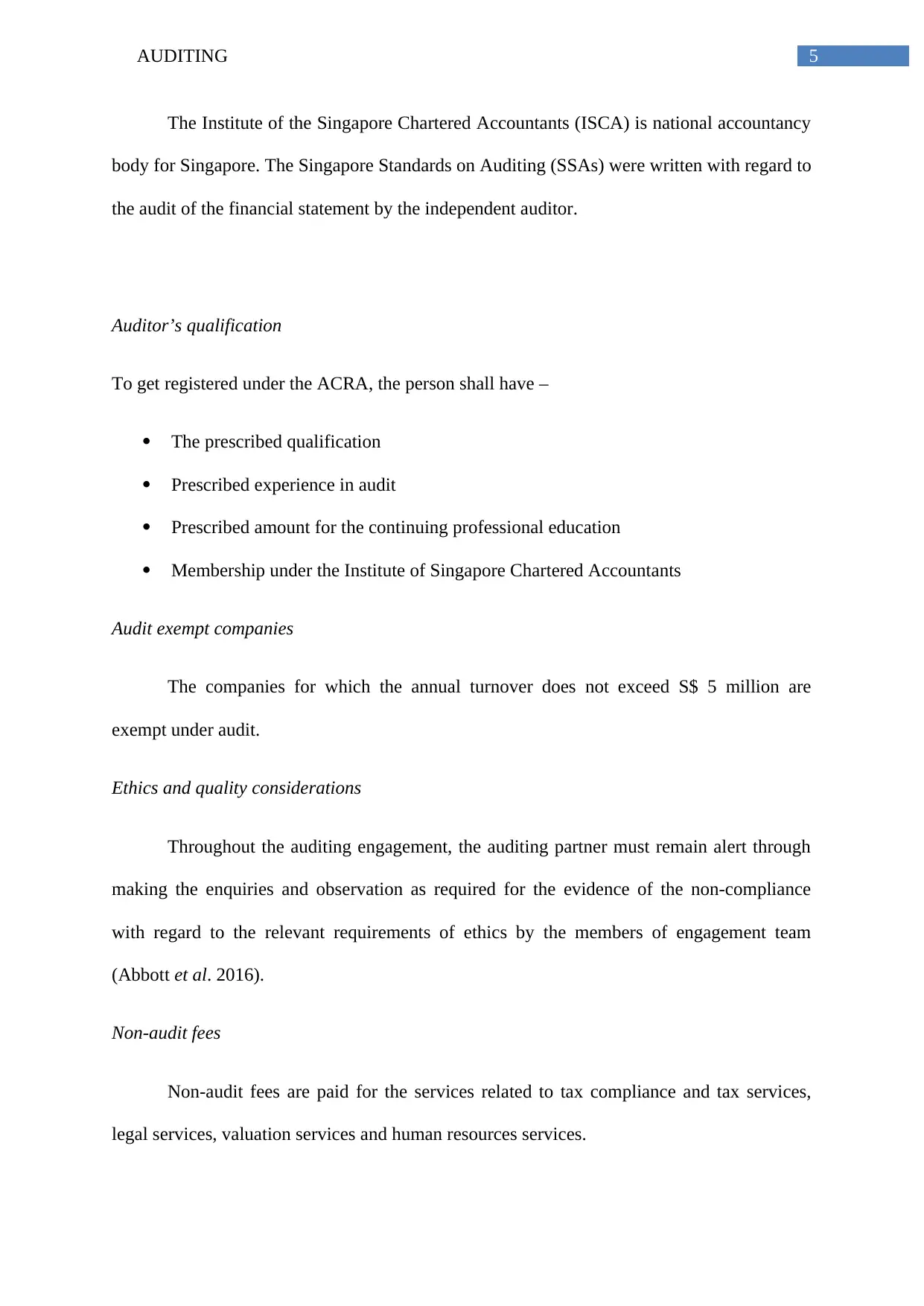
5AUDITING
The Institute of the Singapore Chartered Accountants (ISCA) is national accountancy
body for Singapore. The Singapore Standards on Auditing (SSAs) were written with regard to
the audit of the financial statement by the independent auditor.
Auditor’s qualification
To get registered under the ACRA, the person shall have –
The prescribed qualification
Prescribed experience in audit
Prescribed amount for the continuing professional education
Membership under the Institute of Singapore Chartered Accountants
Audit exempt companies
The companies for which the annual turnover does not exceed S$ 5 million are
exempt under audit.
Ethics and quality considerations
Throughout the auditing engagement, the auditing partner must remain alert through
making the enquiries and observation as required for the evidence of the non-compliance
with regard to the relevant requirements of ethics by the members of engagement team
(Abbott et al. 2016).
Non-audit fees
Non-audit fees are paid for the services related to tax compliance and tax services,
legal services, valuation services and human resources services.
The Institute of the Singapore Chartered Accountants (ISCA) is national accountancy
body for Singapore. The Singapore Standards on Auditing (SSAs) were written with regard to
the audit of the financial statement by the independent auditor.
Auditor’s qualification
To get registered under the ACRA, the person shall have –
The prescribed qualification
Prescribed experience in audit
Prescribed amount for the continuing professional education
Membership under the Institute of Singapore Chartered Accountants
Audit exempt companies
The companies for which the annual turnover does not exceed S$ 5 million are
exempt under audit.
Ethics and quality considerations
Throughout the auditing engagement, the auditing partner must remain alert through
making the enquiries and observation as required for the evidence of the non-compliance
with regard to the relevant requirements of ethics by the members of engagement team
(Abbott et al. 2016).
Non-audit fees
Non-audit fees are paid for the services related to tax compliance and tax services,
legal services, valuation services and human resources services.
⊘ This is a preview!⊘
Do you want full access?
Subscribe today to unlock all pages.

Trusted by 1+ million students worldwide
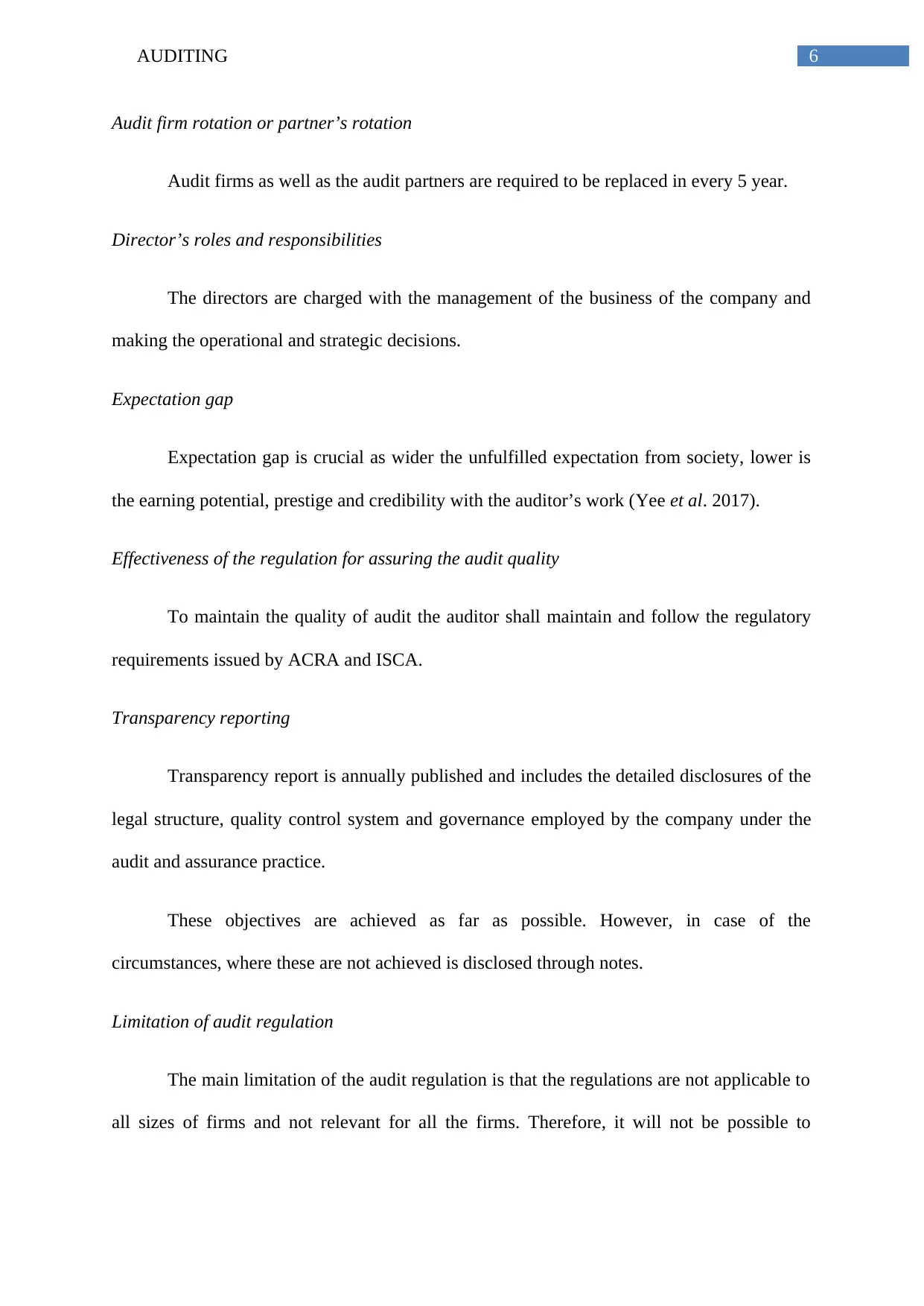
6AUDITING
Audit firm rotation or partner’s rotation
Audit firms as well as the audit partners are required to be replaced in every 5 year.
Director’s roles and responsibilities
The directors are charged with the management of the business of the company and
making the operational and strategic decisions.
Expectation gap
Expectation gap is crucial as wider the unfulfilled expectation from society, lower is
the earning potential, prestige and credibility with the auditor’s work (Yee et al. 2017).
Effectiveness of the regulation for assuring the audit quality
To maintain the quality of audit the auditor shall maintain and follow the regulatory
requirements issued by ACRA and ISCA.
Transparency reporting
Transparency report is annually published and includes the detailed disclosures of the
legal structure, quality control system and governance employed by the company under the
audit and assurance practice.
These objectives are achieved as far as possible. However, in case of the
circumstances, where these are not achieved is disclosed through notes.
Limitation of audit regulation
The main limitation of the audit regulation is that the regulations are not applicable to
all sizes of firms and not relevant for all the firms. Therefore, it will not be possible to
Audit firm rotation or partner’s rotation
Audit firms as well as the audit partners are required to be replaced in every 5 year.
Director’s roles and responsibilities
The directors are charged with the management of the business of the company and
making the operational and strategic decisions.
Expectation gap
Expectation gap is crucial as wider the unfulfilled expectation from society, lower is
the earning potential, prestige and credibility with the auditor’s work (Yee et al. 2017).
Effectiveness of the regulation for assuring the audit quality
To maintain the quality of audit the auditor shall maintain and follow the regulatory
requirements issued by ACRA and ISCA.
Transparency reporting
Transparency report is annually published and includes the detailed disclosures of the
legal structure, quality control system and governance employed by the company under the
audit and assurance practice.
These objectives are achieved as far as possible. However, in case of the
circumstances, where these are not achieved is disclosed through notes.
Limitation of audit regulation
The main limitation of the audit regulation is that the regulations are not applicable to
all sizes of firms and not relevant for all the firms. Therefore, it will not be possible to
Paraphrase This Document
Need a fresh take? Get an instant paraphrase of this document with our AI Paraphraser
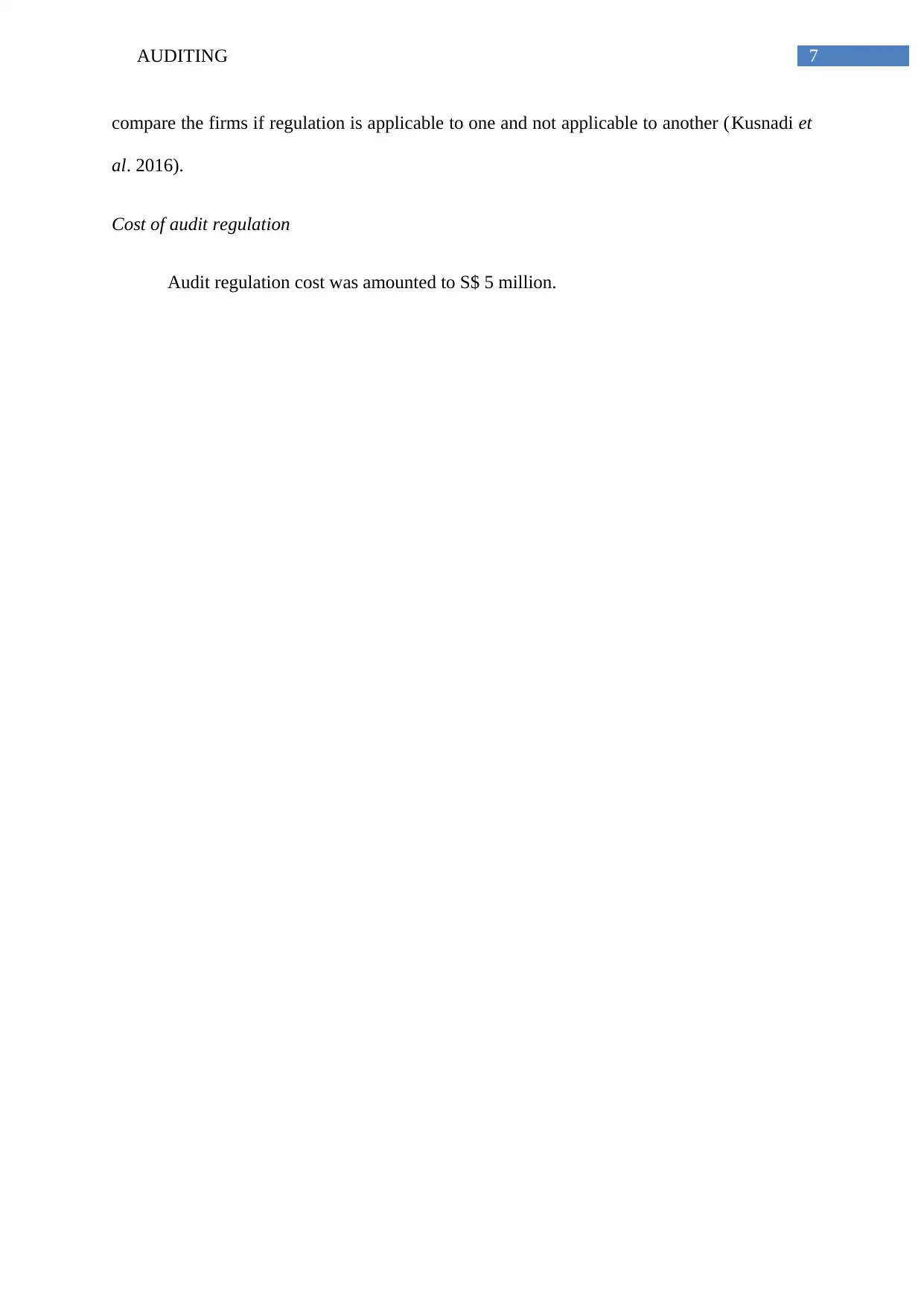
7AUDITING
compare the firms if regulation is applicable to one and not applicable to another (Kusnadi et
al. 2016).
Cost of audit regulation
Audit regulation cost was amounted to S$ 5 million.
compare the firms if regulation is applicable to one and not applicable to another (Kusnadi et
al. 2016).
Cost of audit regulation
Audit regulation cost was amounted to S$ 5 million.
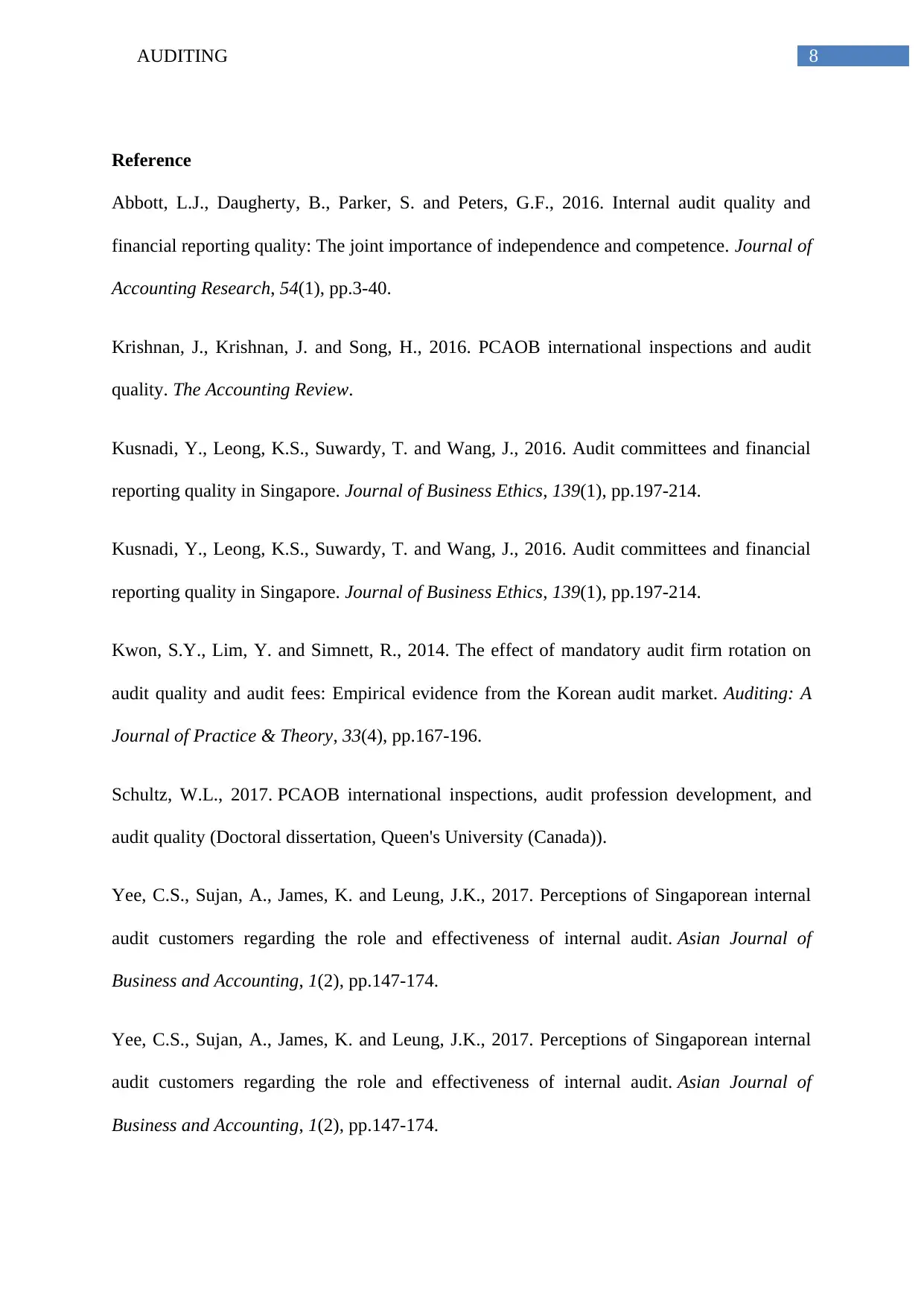
8AUDITING
Reference
Abbott, L.J., Daugherty, B., Parker, S. and Peters, G.F., 2016. Internal audit quality and
financial reporting quality: The joint importance of independence and competence. Journal of
Accounting Research, 54(1), pp.3-40.
Krishnan, J., Krishnan, J. and Song, H., 2016. PCAOB international inspections and audit
quality. The Accounting Review.
Kusnadi, Y., Leong, K.S., Suwardy, T. and Wang, J., 2016. Audit committees and financial
reporting quality in Singapore. Journal of Business Ethics, 139(1), pp.197-214.
Kusnadi, Y., Leong, K.S., Suwardy, T. and Wang, J., 2016. Audit committees and financial
reporting quality in Singapore. Journal of Business Ethics, 139(1), pp.197-214.
Kwon, S.Y., Lim, Y. and Simnett, R., 2014. The effect of mandatory audit firm rotation on
audit quality and audit fees: Empirical evidence from the Korean audit market. Auditing: A
Journal of Practice & Theory, 33(4), pp.167-196.
Schultz, W.L., 2017. PCAOB international inspections, audit profession development, and
audit quality (Doctoral dissertation, Queen's University (Canada)).
Yee, C.S., Sujan, A., James, K. and Leung, J.K., 2017. Perceptions of Singaporean internal
audit customers regarding the role and effectiveness of internal audit. Asian Journal of
Business and Accounting, 1(2), pp.147-174.
Yee, C.S., Sujan, A., James, K. and Leung, J.K., 2017. Perceptions of Singaporean internal
audit customers regarding the role and effectiveness of internal audit. Asian Journal of
Business and Accounting, 1(2), pp.147-174.
Reference
Abbott, L.J., Daugherty, B., Parker, S. and Peters, G.F., 2016. Internal audit quality and
financial reporting quality: The joint importance of independence and competence. Journal of
Accounting Research, 54(1), pp.3-40.
Krishnan, J., Krishnan, J. and Song, H., 2016. PCAOB international inspections and audit
quality. The Accounting Review.
Kusnadi, Y., Leong, K.S., Suwardy, T. and Wang, J., 2016. Audit committees and financial
reporting quality in Singapore. Journal of Business Ethics, 139(1), pp.197-214.
Kusnadi, Y., Leong, K.S., Suwardy, T. and Wang, J., 2016. Audit committees and financial
reporting quality in Singapore. Journal of Business Ethics, 139(1), pp.197-214.
Kwon, S.Y., Lim, Y. and Simnett, R., 2014. The effect of mandatory audit firm rotation on
audit quality and audit fees: Empirical evidence from the Korean audit market. Auditing: A
Journal of Practice & Theory, 33(4), pp.167-196.
Schultz, W.L., 2017. PCAOB international inspections, audit profession development, and
audit quality (Doctoral dissertation, Queen's University (Canada)).
Yee, C.S., Sujan, A., James, K. and Leung, J.K., 2017. Perceptions of Singaporean internal
audit customers regarding the role and effectiveness of internal audit. Asian Journal of
Business and Accounting, 1(2), pp.147-174.
Yee, C.S., Sujan, A., James, K. and Leung, J.K., 2017. Perceptions of Singaporean internal
audit customers regarding the role and effectiveness of internal audit. Asian Journal of
Business and Accounting, 1(2), pp.147-174.
⊘ This is a preview!⊘
Do you want full access?
Subscribe today to unlock all pages.

Trusted by 1+ million students worldwide
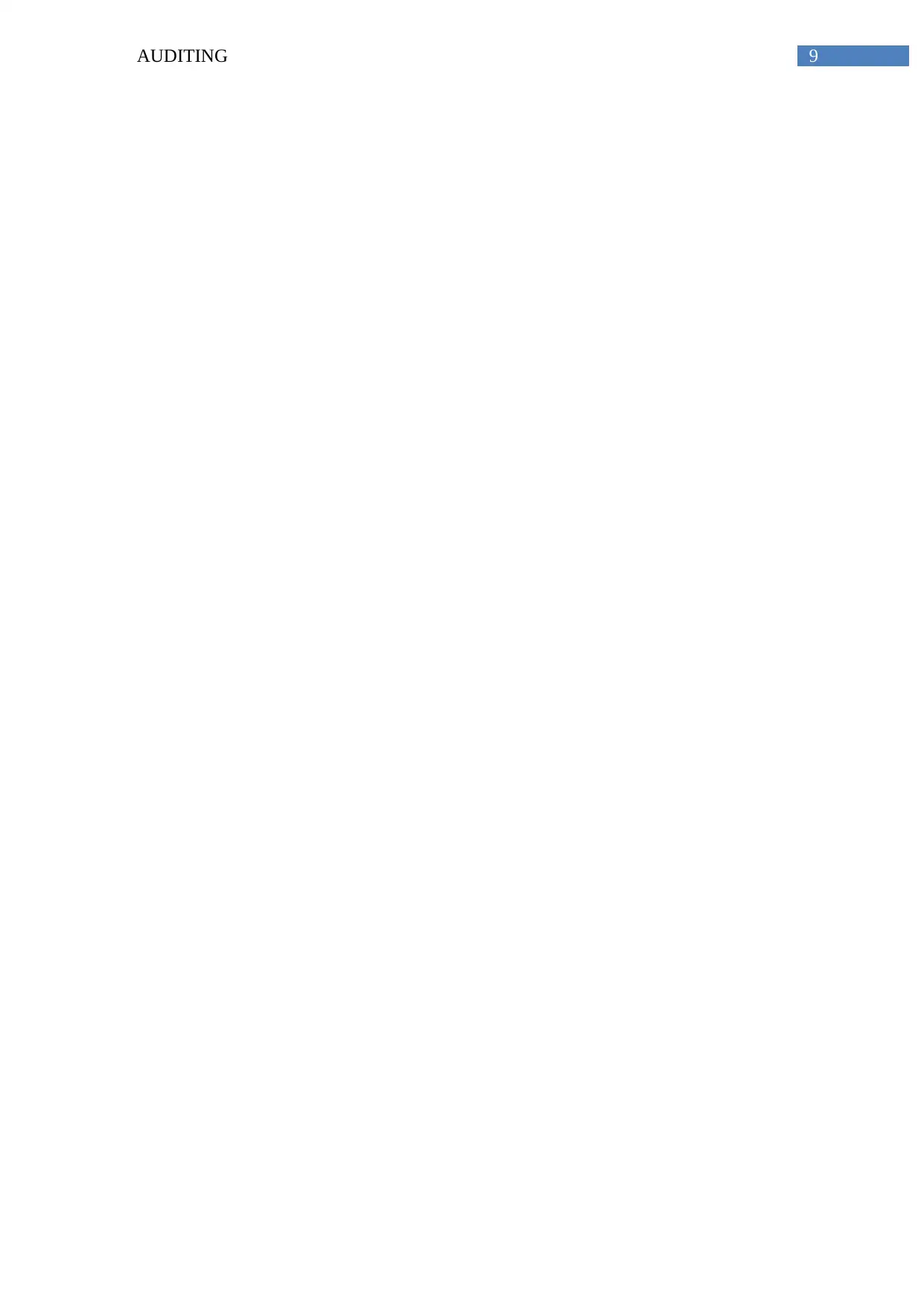
9AUDITING
1 out of 10
Related Documents
Your All-in-One AI-Powered Toolkit for Academic Success.
+13062052269
info@desklib.com
Available 24*7 on WhatsApp / Email
![[object Object]](/_next/static/media/star-bottom.7253800d.svg)
Unlock your academic potential
Copyright © 2020–2026 A2Z Services. All Rights Reserved. Developed and managed by ZUCOL.



